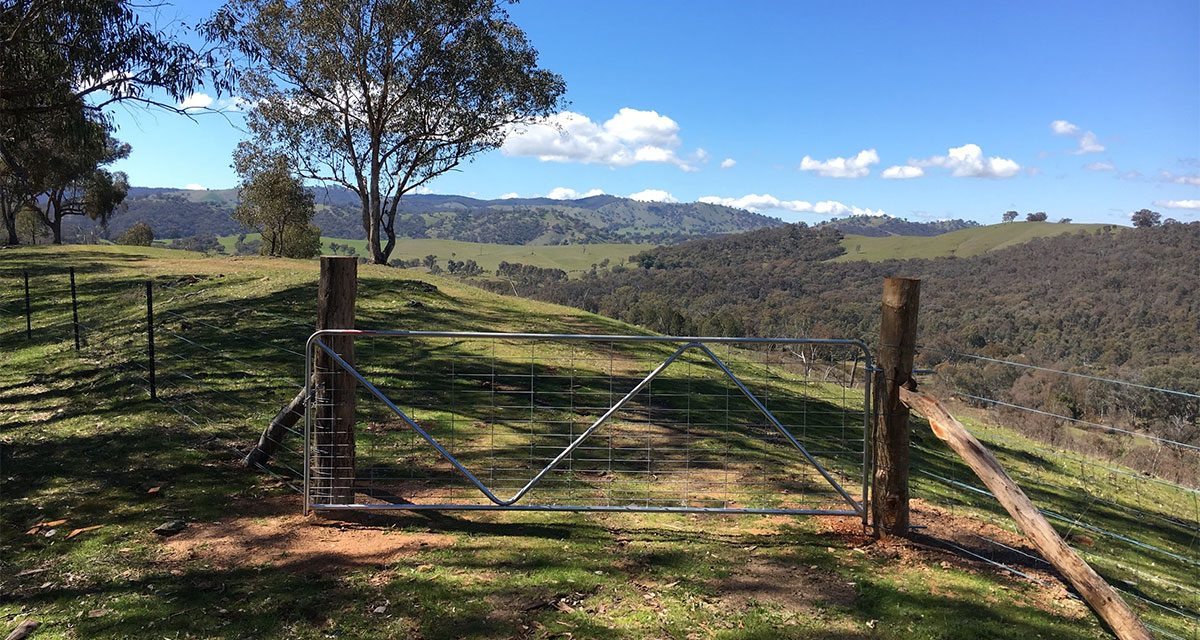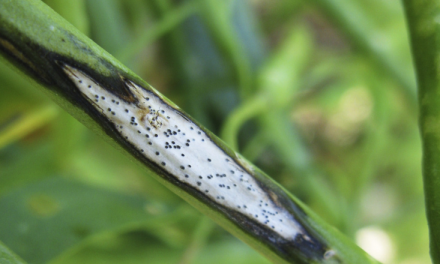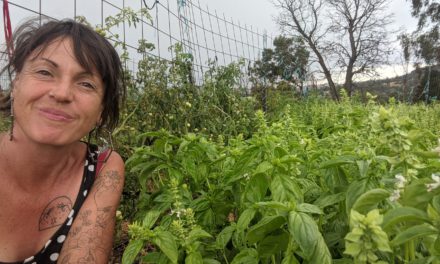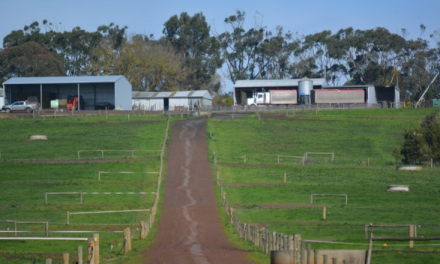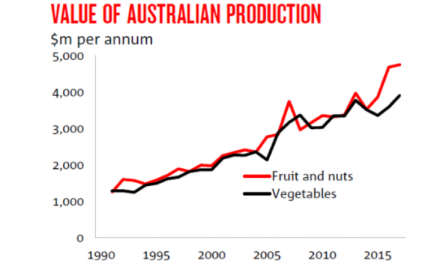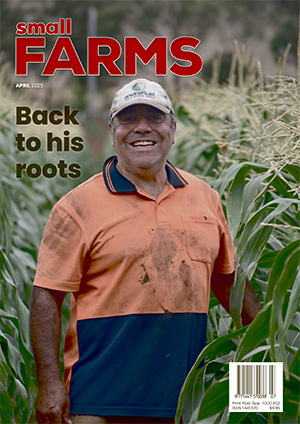Fleeing city life after being born “in the wrong place” one Sydney couple retreated to the beauty of the Snowy Mountains and set about creating a small farm life of ethical and sustainable production.
Former Sydneysiders Louise Freckelton and David Bray made the move to the country five years ago after they could no longer ignore their desire, need even, to get away from big-city living.
In Louise’s words the couple were “simply born in the wrong place”.
“We ran away from Sydney to be close to our beloved Snowy Mountains and along the way we became farmers by accident,” Louise said.
The couple practice small scale, ethical and sustainable farming alongside conserving their Box Gum grassy woodland after purchasing their property, Highfield Farm and Woodland, near Adelong in NSW.
The couple have two thirds of their farm protected under a conservation covenant and farm the rest.
“We are so delighted to be custodians of our conservation area which provides habitat for rare and endangered birds and the covenant was one of the reasons we were attracted to Highfield in the first place,” she said.
The self confessed foodies became farmers after searching for great tasting and ethically raised food and now produce Dorper sheep for high quality lamb, Dexter cattle and pasture-raised chickens for eggs.
The couple chose hardy breeds that specifically fit into the climatic conditions of their property.
All there animals are grass-fed, predominately on native pasture.
“The Dorpers do really well on our native pasture while the Dexters are a heritage breed that has less impact on the ground because of their smaller size – both are really tough and hardy.
“We are in love with our mini herd of Dexter cattle.
“Dexters are a small breed of dual-purpose (providing milk and meat) cattle from Ireland.
“Once a rare breed, they are now classified as recovering – our girls are Geranium, Dora, Hazel, Calendula and Violet. We have also just welcomed new calves – Pansy, Rusty and Coco.”
Louise said they occasionally have beef for sale and as with their lamb it is entirely grassfed on mostly native pasture.
“We are planning to expand our cattle herd this year so we can offer our beautiful beef weekly via local farmers’ markets – so watch this space.”
Louise said their Dorpers (a breed developed in South Africa from Dorset Horn sheep and Black-headed Persian sheep) are hardy and thrive on the native pasture the couple have encouraged.
She said with their black heads, chunky bodies and horizontal ears “they’re good to look at, and best of all, they produce fantastic marbled lamb”.
“You can also be assured they are grassfed. We do not feed them grain or send them off to feedlots to ‘finish’.”
The welfare of their stock is always the couple’s main priority and from the moment every animal is born, it is treated with kindness and care.
“We use low-stress stock handling techniques to move our animals. We don’t have a motorbike or dog and we do all our stock work on foot.
“And we don’t finish our sheep or cattle on grain because we don’t believe in hurrying growth.”
The chickens were added to the mix as a way of fertilising pastures and the couple see the eggs merely as a by-product.
“The first place the animals graze in a new paddock is always where the chickens have been,” Louise adds.
“We run a mixed flock and we breed all our own replacement hens. We take responsibility for our roosters and grow them out and use them to make homemade chicken stock which we sell at the farmers markets, along with all our other products.”
These include lamb, lamb small goods, gourmet sausages, eggs, pickles and ferments made with produce from their garden, salts and mustards and soaps.
“We like to use as much of our animals as possible. Our soaps utilise the suet from our lambs and are expertly made by our friend Gwen Robertson from Back to Earth Soaps in Wodonga.
‘We offer calendula and bergamot, rosehip luxury, sandalwood and coconut cream, honey and oatmeal, and gardeners – all are gentle on the skin.”
Louise firmly believes small small-scale farming and environmental conservation can go together.
“We are successfully combining both and it isn’t a sacrifice at all. Overall the health of our animals and the health of our land is improving and that is such a great thing.”
Louise said it all works hand in hand.
“Trees on the hills provide shelter for the animals and help reduce soil erosion and they encourage birds which help with pest control.”
The wattle Acacia Paradoxa is a plant farmers love to hate but Louise said it is a great example of a shrub that can work for both the environment and the farm.
“The acacia fix nitrogen into the soil and the pods they produce when eaten by sheep, have an anti worming property as well. These happily grow on the slopes of our hilly country while helping protect the ground from soil erosion.”
Another native plant Louise encourages the growth of is the carex grass which grows in the bottom of the valleys.
Agronomists initially told her to ‘nuke’ it because it wasn’t a grass that the sheep will eat but she has found it slows up the flow of water, filters it before it hits the dam and makes a great habitat for shrub wrens.
“While it is not palatable for the sheep, it makes a great protected place for them to lamb.”
Since her career change to farming, Louise has participated in many courses, some which have been helpful – and some which have not.
She obtained a Diploma in Organic Farming at Riverina Tafe which overall helped clarify her thinking.
“That diploma has allowed me to throw out the information I didn’t want and refine how I wanted my farm to work.
“We might be poorer now financially but we are definitely richer,” she jokes.
“David and I do have such a rich life now. We have learnt a lot about the habitat we live in and have been able to undo some of things which have degraded our landscape which makes this all so worthwhile.
“We handle our sheep, cattle and chickens with the ‘five freedoms’ in mind when it comes to handling animals ethically and responsibly.
“Farming can go hand in hand with conversation and there are many benefits when you view the environment differently and work with the habitat you have got.”
Two-thirds of Highfield is under its conservation covenant protecting one of Australia’s rarest habitats – the box gum grassy woodland.
This habitat was once common throughout eastern Australia, but since European settlement as much as 80-95 per cent has been cleared for grazing and cropping.
Louise said these woodlands now occur mostly in isolated fragments on private land on the western NSW slopes of the Great Dividing Range.
She said Highfield protects one of those precious fragments of woodland so theirs is a haven of life and a refuge for the threatened.
“We have recorded 115 different species of birds on Highfield, including the critically endangered Regent Honeyeater and other classic woodland birds such as the Crested Shrike-tit, Brown Tree-creeper, Hooded Robin, Speckled Warbler and Diamond Firetail,” she added.
“For example, Hooded Robins are classified as vulnerable in NSW because their habitat is now rare.
“They are found in lightly timbered woodland dominated by acacia and/or eucalypts, just the kind of habitat Highfield cares for. Even though they are vulnerable we see them pretty much every day.
“Adult males are black and white with a black hood and back, white underpants, black wings, white shoulder bar and wing stripe. Females are similar to males but greyer with a brown-grey head and a dark brown wing with a white stripe. “They are usually seen in pairs or small groups and are rather shy and quiet.
“Hoodies, as we call them, sit on exposed perches such as dead branches and stumps and pounce on insects and they forage on, or near, the ground.”
She said they leave some fallen wood in their paddocks so the Hoodies have handy hunting perches.
“Wildflowers once common in these woodlands are now also returning to the forest floor.
“We are given valuable advice and support in our efforts by the Nature Conservation Trust of NSW.
“In addition to our protected area of woodland we are also working towards making our farming area wildlife friendly by linking conservation areas through corridor plantings, adding paddock trees and fencing off sensitive drainage lines and grasslands.”
And the best thing of all, Louise doesn’t miss the city lights one bit.
“Every night I have the best light show you can imagine and it comes from the stars.”
Contact:
Louise Freckelton
Highfield Farm
349 Scholz Rd
Adelong, NSW
P: 0429 985 222
W: www.highfieldfarmwoodland.com

